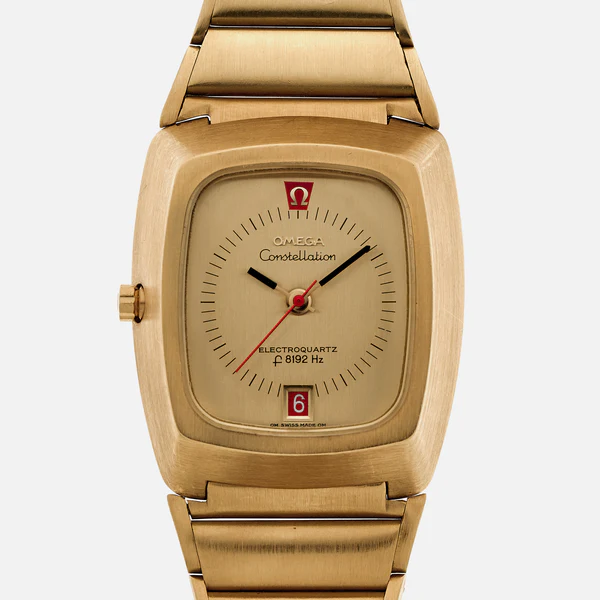Don't miss the next drop
Omega Constellation Electroquartz 196.005
Last updated: July 21, 2025

Brand:
Model Line:
Production Period:
1970-1976
Caliber/s:
Case Width:
37mm
Case Height:
44mm
Lug Width:
20mm
Omega Constellation Electroquartz 196.005 Description
The Omega Constellation Electroquartz, primarily identified by reference 196.005 (specifically BA 196.005 for 18k Gold and ST 196.0005 for Stainless Steel), represents a pivotal moment in Swiss watchmaking history. Produced between 1970 and 1976 , it was among the very first Swiss analogue quartz watches offered to the public, born from a collaborative effort (the Centre Electronique Horloger or CEH) to counter the burgeoning “Quartz Crisis”. Its significance lies in housing the groundbreaking Beta 21 movement (Omega Calibre 1300), known for its high accuracy (±5 seconds/month), 8192 Hz frequency, and unique sweeping seconds hand. Key features include a distinctively bold, angular, and often asymmetrical “Pupitre” case design (approx. 37mm wide) , an unconventional left-hand crown at 9 o’clock with an integrated pusher for electronic setting , and its placement within Omega’s prestigious Constellation line. Offered in luxurious 18k gold or stainless steel, often with integrated bracelets, it was a high-priced, technologically advanced statement piece. Due to the limited production of the Beta 21 movement (estimated 6,000 total, with Omega using perhaps 9,000-11,000 Cal. 1300 units) , the Electroquartz 196.005 is relatively rare and holds significant historical importance, though its complex early quartz movement presents serviceability challenges for collectors today.
Specifications
| Reference Nos. | ST 196.0005 (Steel), BA 196.005 (18k Gold) (Often generically referred to as 196.005) |
| Production Years | 1970 – 1976 |
| Case Material | Stainless Steel, 18k Yellow Gold |
| Case Dimensions | Width: 37mm, Height: 44mm (Omega data); Thickness: ~13mm+ (tapering reported 14.7mm-12.2mm on gold) |
| Case Shape | Angular / Asymmetrical (“Pupitre”) |
| Case Constr. | With screws (securing case back) |
| Crown Position | Left side (9 o’clock), with integrated pusher |
| Movement | Omega Calibre 1300 (Beta 21) |
| Movement Type | Quartz electronic analogic |
| Frequency | 8192 Hz (Oscillator) |
| Jewels | 13 |
| Features | Sweep seconds, Date at 6h, Electronic setting via crown pusher |
| Crystal | Mineral Glass (likely standard/steel); Sapphire (reported on 18k gold/service) |
| Water Resist. | 3 bar (30 metres / 100 feet) |
| Bracelet/Strap | Integrated Steel (e.g., Ref. 1185) / 18k Gold (e.g., Ref. 396.802); Leather strap options |
(Note on Dimensions: Official Omega data lists 37x44mm. Dealer listings often vary slightly. Thickness is consistently ~13mm or more.) (Note on Crystal: Sources conflict; mineral glass was common, sapphire plausible for gold models/service.)
Variations and Key Features
The Omega Constellation Electroquartz Ref. 196.005 is defined by its groundbreaking movement and distinctive 1970s design. Key features and variations include:
Case:
- Shape: Unique angular, asymmetrical “Pupitre” (desk) shape, often wider at 12 than 6 o’clock.
- Materials: Available in Stainless Steel (ST 196.0005) or 18k Yellow Gold (BA 196.005).
- Construction: Two-piece case with the back secured by screws.
- Crown: Positioned unconventionally at 9 o’clock (left-hand side). Features an integrated central pusher for electronic setting functions.
Movement (Calibre 1300 / Beta 21):
- Type: Early Swiss analogue quartz movement developed collaboratively by the CEH consortium.
- Frequency: Quartz oscillator at 8192 Hz.
- Seconds Hand: Features a smooth sweeping seconds hand, driven by a 256 Hz resonator, mimicking mechanical watches.
- Accuracy: High accuracy for the era, rated at ±5 seconds per month.
- Setting: Unique electronic setting via crown pusher for seconds/minutes; independent hour/date setting via crown pull.
- Jewels: 13 jewels.
Dial:
- Colors: Known examples include Blue and Gold/Champagne (especially on gold models).
- Markers: Applied “index” or baton hour markers.
- Hands: Metal “stick” hands.
- Date: Date window positioned at 6 o’clock. Sometimes features a contrasting red date wheel on gold models.
- Text: Signed “Constellation” and “Electroquartz f8192 Hz”. Solid gold models feature “OM SWISS MADE OM” at the bottom. Some models may have a red background Omega logo. (Note: “Stardust” dials, known on other Constellations , are not confirmed for Ref. 196.005 in the provided sources).
Crystal:
- Likely Mineral Glass as standard, particularly on steel models. Sapphire Crystal reported on 18k gold models and possibly used as service replacements.
Bracelet/Strap:
- Often featured integrated bracelets in matching steel (e.g., Ref. 1185 ) or 18k gold (e.g., Ref. 396.802 ). Leather strap options were also available.
Additional Information
Historical Significance & Rarity: The Constellation Electroquartz 196.005 is historically significant as one of the very first Swiss analogue quartz watches available commercially, representing Omega’s high-tech response during the Quartz Crisis. Its Beta 21 movement was a product of a unique industry collaboration (CEH). Production was limited due to the low overall output of Beta 21 movements (estimated 6,000 total) and the watch’s high initial price point, making it relatively rare today.
Collectibility & Serviceability: Collectors value the 196.005 for its pioneering technology, unique 1970s design, Constellation heritage, and rarity. However, the primary challenge is the serviceability of the Calibre 1300 (Beta 21) movement. Spare parts and expertise for this early, complex quartz movement are scarce, making repairs difficult and potentially expensive. This impacts its practicality as a daily wearer but enhances its status as a historical artifact. Condition, originality (especially dial, hands, case finish, bracelet), and functional status of the movement are key value drivers.
As an eBay Partner, we may be compensated if you make a purchase.
